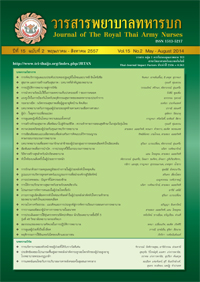การศึกษาการจัดการภาวะภัยพิบัติทางการพยาบาล A Study of Disaster Nursing Management
Keywords:
การจัดการภาวะภัยพิบัติ, ภาวะภัยพิบัติ, Disaster Nursing Management, DisasterAbstract
การวิจัยครั้งนี้เป็นงานวิจัยเชิงบรรยายแบบ Delphi technique มีวัตถุประสงค์เพื่อศึกษาการจัดการภาวะภัยพิบัติทางการ พยาบาลที่พึงประสงค์ในอนาคต ผู้ให้ข้อมูลหลักได้แก่ผู้เชี่ยวชาญที่มีความรู้และประสบการณ์ด้านภัยพิบัติ รวมทั้งมีความยินดีในการ ให้ข้อมูลการวิจัย จำนวน 21 คน แบ่งเป็น 4 กลุ่มได้แก่ 1) กลุ่มผู้บริหารและผู้ปฏิบัติการพยาบาล 8 คน 2) กลุ่มอาจารย์พยาบาล ที่มีผลงานด้านภัยพิบัติ 5 คน 3) กลุ่มแพทย์ผู้เชี่ยวชาญด้านภัยพิบัติ 5 คน และ 4) กลุ่มผู้ที่มีส่วนเกี่ยวข้องด้านนโยบายการจัดการ ภาวะภัยพิบัติ 3 คน
ผลการวิจัยพบว่า กลุ่มผู้เชี่ยวชาญมีความคิดเห็นสอดคล้องกันว่า ควรแบ่งการจัดการภาวะภัยพิบัติทางการพยาบาล เป็น 3 ระยะ ได้แก่ 1) ระยะการเตรียมความพร้อมก่อนเกิดภัยพิบัติ ได้แก่ วางแผนจัดการด้านภัยพิบัติที่ส่งผลต่อสุขภาพของชุมชน พัฒนาระบบบริการพยาบาลด้านภัยพิบัติ กำหนดแผนงานด้านภัยพิบัติสำหรับองค์กรพยาบาล พัฒนาสมรรถนะบุคลากรทางการ พยาบาลด้านภัยพิบัติ และจัดเตรียมทรัพยากรทางการพยาบาลเพื่อรับมือกับภัยพิบัติ 2) ระยะการรับมือกับภัยพิบัติ ได้แก่จัดระบบ ความปลอดภัยของผู้ประสบภัยและบุคลากรทางการพยาบาล จัดบริการพยาบาลในภาวะภัยพิบัติจัดการทรัพยากรและสาธารณูปโภค ในภาวะภัยพิบัติ และจัดสรรบุคลากรทางการพยาบาลเพื่อปฏิบัติงานขณะเกิดภัยพิบัติและ 3) ระยะการฟื้นฟูสภาพหลังสิ้นสุด ภัยพิบัติ ได้แก่ช่วยเหลือเยียวยาผู้ประสบภัยและบุคลากรทางการพยาบาลที่ได้รับผลกระทบ สรุปผลการดำเนินงานด้านภัยพิบัติของ องค์กรพยาบาล จัดบริการพยาบาลหลังสิ้นสุดภัยพิบัติร่วมกับหน่วยงานภาคีเครือข่าย และฟื้นฟูระบบบริการพยาบาลและสิ่งแวดล้อม กรณีได้รับผลกระทบจากภัยพิบัติ รวม 13 ด้านหลัก 79 ข้อรายการ ค่ามัธยฐานของข้อรายการอยู่ในช่วง 4.34 - 4.73 ค่าพิสัย ระหว่างควอไทล์ของข้อรายการอยู่ในช่วง 0.28 - 0.91
ผลการวิจัยสามารถใช้เป็นแนวทางการจัดการภาวะภัยพิบัติทางการพยาบาล และสามารถนำผลการวิจัยไปพัฒนา สมรรถนะบุคลากรทางการพยาบาลให้มีทักษะในการจัดการภาวะภัยพิบัติอย่างมีประสิทธิภาพต่อไป
This research was a descriptive research using the Delphi technique. The purpose was to study on disaster nursing management from 21 experts in disasters which were divided into 4 groups including 1) 8 nursing managers and clinical practice nurses, 2) 5 nursing instructors, 3) 5 physicians, and 4) 3 experts involved in the policy of disaster management.
The results revealed that the experts’ opinion had a consensus on disaster nursing management should be divided into 3 phases: 1) Preparedness phase: management plan of disaster affecting to health of the community, development of nursing services for disaster care, development of disaster plan for nursing organizations, development of disaster nursing competencies, and provision of nursing resources for disaster management. 2) Response phase: arrangement of a security system for victims and nursing personnel, provision of nursing services during disaster, resource and infrastructure management during disaster, and allocation of nursing personnel to deal with disasters. 3) Recovery phase: healing victims and nursing personnel affected from the disaster, summarizing the operating results of the nursing organization, setting up nursing services after the disaster by cooperating with network partners, and reconstructing nursing service system and environment affected by the disaster. It consisted of 13 domains and 79 items. The median of all items was 4.34-4.73 and the interquartile range of all items was 0.28-0.91.
The research findings can be used as a guideline for initiating effective and systematic disaster nursing management, competency development and disaster nursing management skills
Downloads
Downloads
How to Cite
Issue
Section
License
บทความหรือข้อคิดเห็นใดใดที่ปรากฏในวารสารพยาบาลทหารบกเป็นวรรณกรรมของผู้เขียน ซึ่งบรรณาธิการหรือสมาคมพยาบาลทหารบก ไม่จำเป็นต้องเห็นด้วย
บทความที่ได้รับการตีพิมพ์เป็นลิขสิทธิ์ของวารสารพยาบาลทหารบก
The ideas and opinions expressed in the Journal of The Royal Thai Army Nurses are those of the authors and not necessarily those
of the editor or Royal Thai Army Nurses Association.






